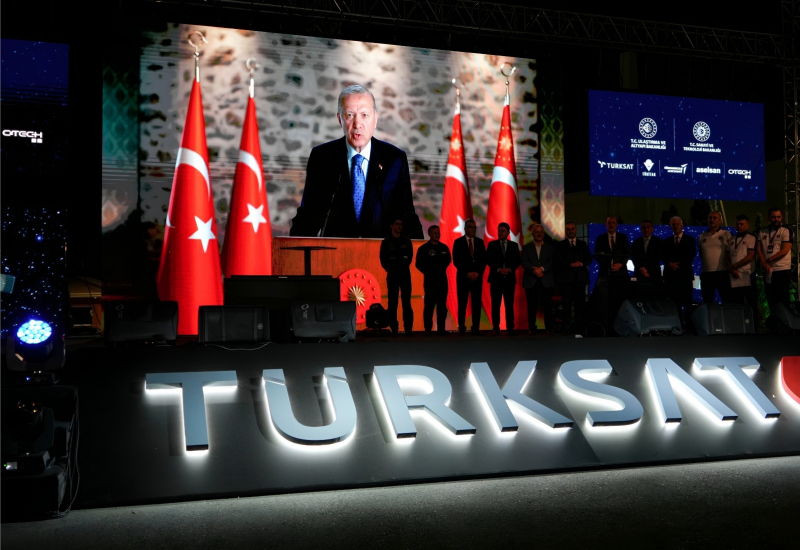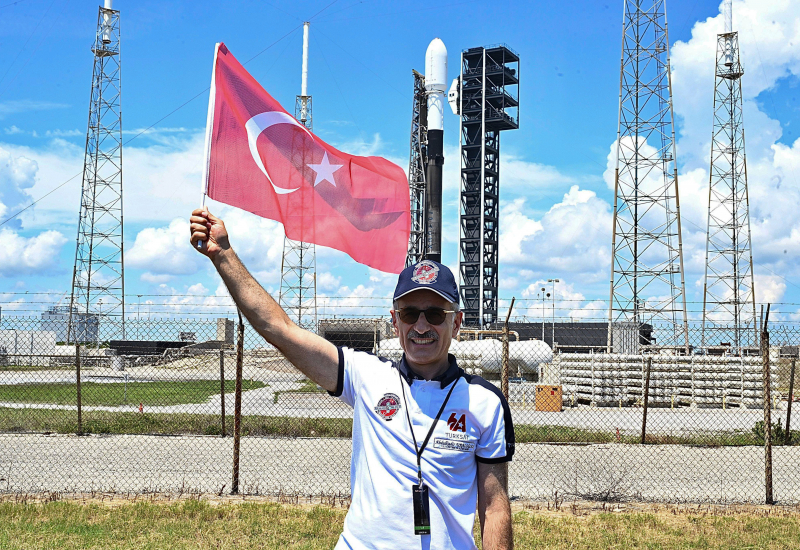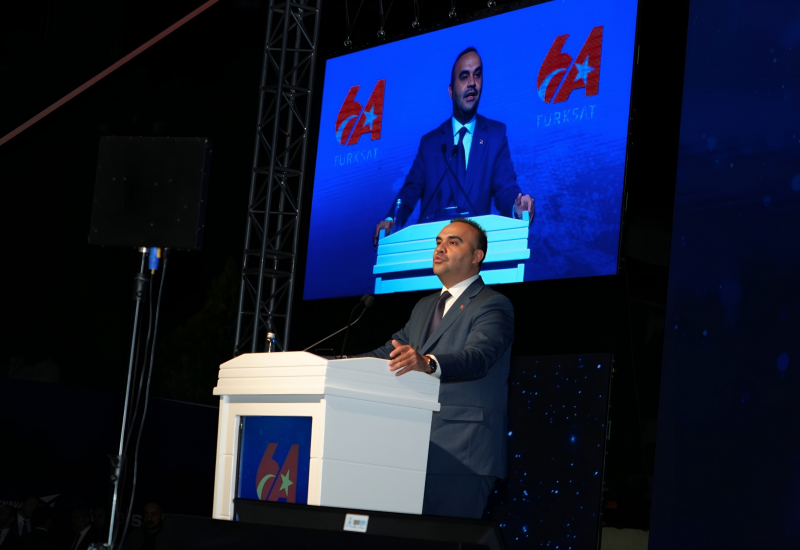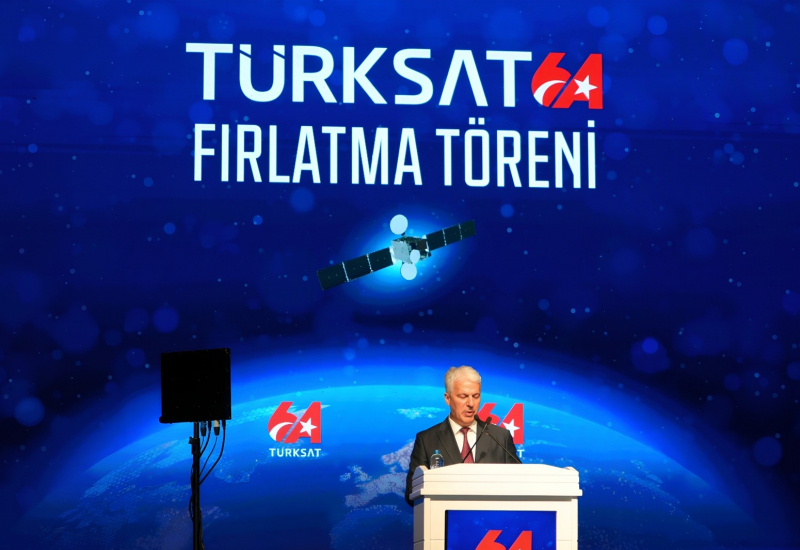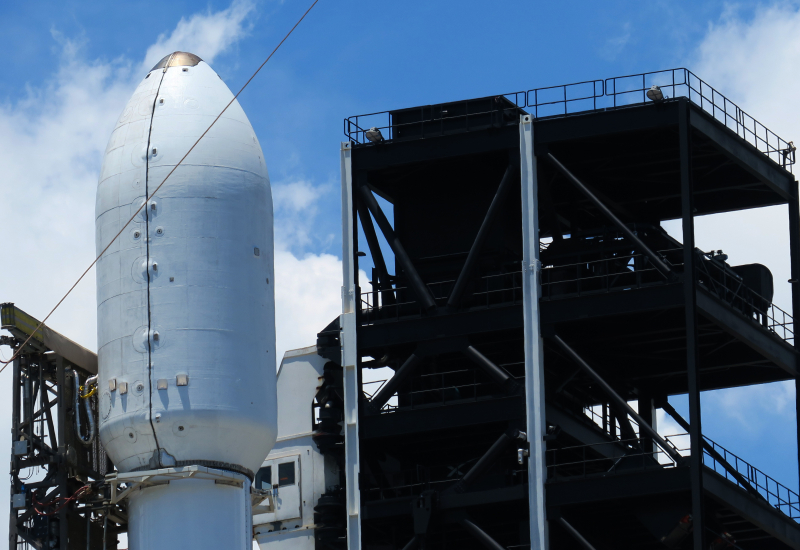Turkey's first indigenous and national communications satellite, Türksat 6A, has been successfully launched into space. The satellite transmitted its first signal at the 67th minute following the launch.
Produced entirely by Turkish engineers utilizing domestic resources, Türksat 6A was launched into space from Cape Canaveral Space Force Station in Florida, USA, aboard a Falcon 9 rocket owned by SpaceX at 02:30. The launch, initially scheduled at 02:30 Turkey time from Launch Complex 40, was delayed several times due to adverse weather conditions.
The launch was observed at the Cape Canaveral base by several Turkish dignitaries, including the Minister of Transport and Infrastructure, Abdulkadir Uraloğlu; Deputy Minister of Transport and Infrastructure, Ömer Fatih Sayan; Türksat CEO, Hasan Hüseyin Ertok; President of TÜBİTAK, Prof. Dr. Hasan Mandal; General Manager of TUSAŞ, Mehmet Demiroğlu; General Manager of ASELSAN, Ahmet Akyol; and General Manager of CTECH, Cüneyd Fırat, along with other accompanying bureaucrats. A pre-launch event was also held at Türksat's Gölbaşı Campus, attended by Vice President Cevdet Yılmaz, Minister of Industry and Technology Mehmet Fatih Kacır, and Chairman of the Türksat Board, Prof. Dr. Kemal Yüksek.
President Recep Tayyip Erdoğan sent a video message to the launch ceremony organized in Gölbaşı, stating, 'Today, we are collectively witnessing another proud moment for our nation and country. We have just launched our indigenous communications satellite, Türksat 6A, into space. In the critical 6A project, which holds significant importance for our country's future in space, we have produced over 81% of the subsystems, ground stations, and software with our national capabilities. Just as with our 5B satellite launched 2.5 years ago, we chose SpaceX's Falcon 9 rocket for this launch.'
Erdoğan further noted that with Türksat 6A, Turkey has entered a new phase in satellite production, stating, 'Our indigenous and national communications satellite, Türksat 6A, will back up existing satellites and enhance capacity. With the operationalization of Türksat 6A, Turkey will ascend to the status of a country capable of producing its own communication satellites.'
First Signal at Minute 67
The Minister of Transport and Infrastructure, Abdulkadir Uraloğlu, announced that the first signal from the Türksat 6A satellite was successfully received at the 67th minute as planned. Uraloğlu stated, "We are both excited and proud. We have reached the end of a decade-long official process. Planning the future is exactly this. We have conducted all the tests and launched our satellite a month ago. We are safeguarding our space homeland and will continue to do so. We can now say that Turkey has ascended to the world league in the defense industry. May Türksat 6A bring good fortune.
Over 16 Years of Fuel Life
Vice President Cevdet Yılmaz expressed his gratitude to all stakeholders involved in the production and testing stages of Turkey's first indigenous satellite, from ASELSAN to TUSAŞ, TÜBİTAK to Türksat, noting that satellite technologies have become a field of strategic importance today. Highlighting that Türksat 6A is the product of a strong political will and national technology initiative, as well as the engineering expertise and know-how gained in the defense industry, Yılmaz stated, "Türksat 6A is the most valuable technology project our country has produced to date. It will operate at the furthest point we have reached in space, 35,786 kilometers, raising the bar in our Sky Homeland. The service area of our communication satellites will expand to include India, Thailand, Malaysia, and Indonesia, providing access to communication services for a population of 5 billion. More than half of the world's population will thus be covered by these high-value services. I would also like to underline the foreign exchange earning and revenue-generating potential of Türksat 6A on this occasion." Yılmaz mentioned that the satellite has an operational life of approximately 15 years and noted its fuel life extends beyond 16 years.
Minister Mehmet Fatih Kacır commented, "With the investments made in satellite technologies, our country has reached a level where it can develop, produce, and test its own satellites. With the Türksat 6A project, which will extend the coverage of our communication satellites to approximately 5 billion people, we have achieved an indigenous production rate of over 80% by domestically manufacturing 84 different types of equipment, including the satellite's flight computers, power distribution and regulation units, star trackers, reaction wheels, and electric propulsion systems. After system integration, we conducted 396 environmental and functional tests to confirm our satellite's readiness for space conditions and launch requirements. We have become one of the 11 countries capable of producing its own communication satellite with all these capabilities. Turkey is in the first eleven of the A-team in satellite technologies. On June 4th, we completed the transportation of our satellite to the launch area, where our colleagues finalized the pre-launch control tests, fueling activities, and integration with the launch vehicle.
National Satellite Brand on the Horizon
Minister Mehmet Fatih Kacır emphasized the critical threshold the project has reached through the successful collaboration of TÜBİTAK Uzay, TUSAŞ, ASELSAN, and CTech teams, stating, "We will achieve another first after the launch. The operation to position our satellite in orbit will be conducted by our engineers for the first time. This will provide us with significant experience for more ambitious projects. Following this historic mission, in line with our National Space Program, we will consolidate the capacity in the public sector under one roof to create a national satellite brand with global competitive strength. We will accelerate the conversion of the technological competencies we have acquired in the satellite production and development process into economic value. We will make the utmost use of our R&D and production capabilities in our new satellite projects and our Moon Program. In accordance with our National Space Program, which showcases our country's vision and ambition in space, we will solidify the position of a strong and independent Turkey in space." He further noted that the population reached by Turkish satellites will exceed 5 billion.
Positioned 35,786 kilometers from Earth, Türksat 6A will operate with 20 Ku Band transponders. With a power of 8.4 kilowatts and a weight of 4,229 kilograms, Türksat 6A will expand Türksat's service area to include India, Thailand, Malaysia, and Indonesia.
With the satellite becoming operational, Turkey will be able to reach over 65% of the world's population with its communication satellites. The population covered by Turkey's satellites will rise from 3.5 billion to over 5 billion.

